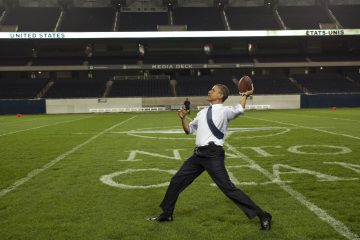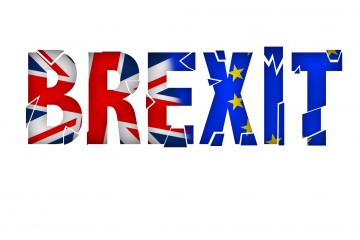
Primaries as Sports and Spectacle: Sports Metaphors in Twenty-First Century Presidential Primary Debates
‘The Brawl Begins’, an article about the 2016 primaries in The Economist provides the most overt manifestation of how a discourse of sports has permeated contemporary political reporting. Describing elections as a “jaw-dropping spectacle” or referring to the Iowa caucuses as the “opening round” in a political boxing match, a prime example of horse-race journalism, is particularly prevalent in presidential primary elections. This is due to the lengthening of the primary period and the truism that the “newsworthiness of what a candidate says about public policies is limited” because “once a candidate makes known his position on an issue, further statements concerning that issue decline in news value”.[1] In these elections, televised debates – which Craig Allen Smith compares to the Super Bowl, …

Will It Kill Us Or Make Us Stronger? How Europe’s Media Covered Brexit
Europe’s newspapers were overwhelmingly negative towards Britain’s vote to leave the European Union, according to a review of the press in thirteen countries in the week after the referendum. Most articles presented the view that Brexit was bad for the EU, would damage their own nation’s interests and would also be bad for Britain. Of the articles that discussed the possibility of following Britain out of the EU, the majority concluded it would not be in their country’s interest to do so. A strong theme was that Brexit highlighted problems within the EU. However the majority view, across all political opinions, was that it should be reformed rather than be allowed to fail. Most also agreed the EU would be worse …

Scotland, Ireland, and Brexit: what history tells us
The BBC published maps of the Remain and Leave votes on 23 June. The Remain map tells us lots of fascinating things, but this post will focus on the Celtic fringe and the historical context for why people may have voted the way they did. Most of Wales is like most of England, with the metropolitan city (Cardiff) voting Remain and the rest of the country mostly for Leave. Note, however, that there is a little dark (pro-Remain) strip in the north and west. The patterns of settlement laid down centuries ago by the English conquest of Wales still leave their mark as that strip is both Welsh-speaking and Remain-leaning. Welsh speakers take their political cues from Plaid Cymru, which …

Brexit Buyers’ Remorse? Non, on ne bregrette rien
The vote to leave the EU was an outcome which surprised most commentators, bookies, and even those who voted for the winning side. In the aftermath of the result, John Gray, a popular political theorist, wrote that ‘voters inflicted the biggest shock on the establishment since Churchill was ousted in 1945’. It is hard to think that he is wrong. The only social classes which predominately voted Remain were ABs (affluent and middle-class voters), whereas C1 C2 DE (lower middle-class and working-class) voters all delivered majorities for Leave. As I predicted on this blog in January and contrary to many commentators’ expectations, the referendum engaged more voters than recent general elections. It generated the highest turnout in a UK election …

Brexit and the Radical Tory Tradition of British Socialism
In the spasms of defeat following the EU referendum, some Remain commentators have suggested that Brexit was a fundamentally racist choice. Indeed, one of the most forceful was Richard Elliot’s assertion on this blog that Brexit supporters are ‘the Cecil Rhodes of the twenty-first century’. Elliot’s article reflects the stifling academic consensus which cannot even comprehend how ‘good people’ could vote to Leave. This breathtakingly simplistic analysis amounts to little more than the assertion that clever, open-minded people voted to Remain whereas stupid, backward people voted to Leave. It echoes the debate over joining the Euro fifteen years ago when, as Larry Elliot reflected, ‘People who liked the Euro were civilised, supported the arts, went to Tuscany or the Dordogne …

Post-Brexit wave of hate has laid bare the tensions and divisions in Britain
Following the vote to leave the European Union, there has been a sudden upsurge in racist incidents in Britain. The wave of hate has taken many people by surprise, and has laid bare some of the tensions and divisions eating away at the heart of the United Kingdom. It has also called into question Britain’s claim to be a liberal and inclusive multicultural society, leading to considerable soul searching. A state that has often spoken out against identity politics and prejudice abroad is now facing up to the reality that these issues need to be addressed back home. Predictably and understandably, much of the recent commentary as focussed on the divisive referendum campaign and the fact that the UK voted …

Go with Dignity – call a snap election!
The Referendum Fallout (so far) Apart from Her Majesty’s Prime Minister and his party-friend (yet Brexit nemesis) both metaphorically falling on their swords, and the leader of Her Most Loyal Opposition encouraged by the Prime Minister to do likewise (“it might be in my party’s interest for him to sit there, it is not in the national interest and I would say: for heaven’s sake man, go!“), the main fallout of the Brexit vote so far for me personally is that it has managed to create yet another division—on top of the geographic and socio-economic divides—by pitting the younger generation against their elders. According to a survey carried out by London School of Economics “the referendum stimulated feelings, particularly among …

Brexiteers Must Fall: Why liberals and the left must combine forces to confront the Cecil Rhodes of the Twenty-First Century
History is written by the victors. In the two weeks that have followed the shock result of the United Kingdom’s referendum on EU membership, a profound sense of horror and foreboding has settled across liberal and progressive Britain. Whatever expectations the British people may have entertained throughout the course of the campaign, it is now painfully clear that the primary result of the referendum will be to hand control to a small number of right-wing demagogues dedicated to reversing the advance of modern cosmopolitan Britain. And this rag-tag cabal looks likely to set the narrative of democratic politics in Britain for years to come. Amidst flawlessly-crafted cries of ‘we want our country back’, Britain will be sold a bombastic, populist …









